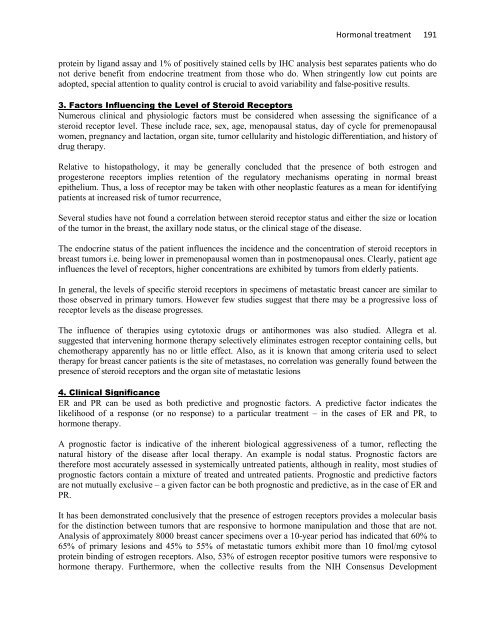Hormonal treatment 190important for hormone-independent ER transcription; region C is the DBD; region D is the hinge domain;region E is the HBD responsible for hormone-dependent transcription; region F is important formodulation of ER activityERβ is expressed in partially different tissues from ERα, notably prostate, ovary, lung, kidney,gastrointestinal tract and especially colon, as well as in tissues where ER is also found, e.g. breast,central nervous system, testis. ER predominates in the uterus and liver. It has clearly been shown thatthe benefit from endocrine therapy is directly proportional to the amount of ER present in the tumor.1. Hormone Receptor AnalysisThe ER has recently originally been determined with cytosol measurements and more recentlyimmunohistochemically (IHC) or with cytosol measurements. The advantages of the cytosolmeasurements via a ligand binding assay, include the generation of numerical results across the whole ofthe likely concentration range, good reproducibility, full technical and clinical validation, inclusion ofmeasures of receptor functionality and existing quality assurance schemes. Disadvantages include arelative large amount of tissue required, the necessary care over handling, storage, assay and dataprocessing, the labor intensive nature of the assay, and the lack of information about the nature of thetissue being homogenized. As improved anti-ER antibodies became available, IHC assay replaced theligand binding assay (LBA). However, there were again advantages and disadvantages. Advantages ofIHC include the fact that routine, fixed.material could be used, archival material could be assayed retrospectively, only small quantities of tissueare needed, receptor content could be related to morphology and there was a measure of cellularity,internal positive control was often provided by the normal epithelial tissue in the section. Thedisadvantages included the subjectivity, the lack of quantitation, the absence of any indication offunctionality of the receptor,. the lack of standardization of staining, the absence of an appropriate qualityQuality assurance schemes are now existing. Several IHC scoring of receptor have been proposed ( andthe lack of clinical validation. An 8-point scoring system from 0-5 points according to the proportion ofstained nuclei, score combining the intensity of staining and proportion of stained nuclei like Allredscore…proportion of nuclei staining and 0-3 for the intensity of staining, with corresponding clinicalrecommendations according to the final score has been proposed by Harvey and colleagues. It wasconcluded by these authors that IHC was probably the more clinical useful score. In another study byGordts and colleagues with 299 breast cancer cases IHC was used in a semi quantitative method andscored between 0 and 300 (the H-score). In this study concordant results between LBA and IHC wereobserved in 230 out of 299 cases (77%) while 69 patients had discordant results (kappa=0.537). Thus forboth LBA and IHC assay, the use of a single cut-off should be avoided and activity quantified, orstratified into categories.2. Definition of Cutoffs for Receptors StatusLike most biological phenomena, endocrine responsiveness is a continuous variable dependent on levelsof ER and, to a lesser extent, PR. This consideration has been lost with the increasing use of the semiquantitativeIHC. Establishing a threshold or lower range in which the likelihood of response is very lowor nil is still important, however. In the past, cutoff points as high as 20 fmol/mg of protein were used todefine ER negativity, perhaps with the notion of giving patients with the remaining “ER+” tumors thehighest probability of responding. Because evidence indicates that tumors with even a small amount ofmeasurable protein, 3 to 10 fmol/mg, have response rates in the 20% to 30% range, classifying them asnegative has two deleterious consequences. First, patients may be denied a trial of hormone therapy, fromwhich they have a good chance of benefiting; second, such classification can lead to the clinicallyerroneous impression that a substantial number of patients with ER- tumors benefit from hormonetherapy. To avoid these pitfalls, stringently low cut points should be adopted. For example, evidencesuggests that setting a cutoff for ER negativity of 3 fmol or less of ER protein per milligram of cytosol
Hormonal treatment 191protein by ligand assay and 1% of positively stained cells by IHC analysis best separates patients who donot derive benefit from endocrine treatment from those who do. When stringently low cut points areadopted, special attention to quality control is crucial to avoid variability and false-positive results.3. Factors Influencing the Level of Steroid ReceptorsNumerous clinical and physiologic factors must be considered when assessing the significance of asteroid receptor level. These include race, sex, age, menopausal status, day of cycle for premenopausalwomen, pregnancy and lactation, organ site, tumor cellularity and histologic differentiation, and history ofdrug therapy.Relative to histopathology, it may be generally concluded that the presence of both estrogen andprogesterone receptors implies retention of the regulatory mechanisms operating in normal breastepithelium. Thus, a loss of receptor may be taken with other neoplastic features as a mean for identifyingpatients at increased risk of tumor recurrence,Several studies have not found a correlation between steroid receptor status and either the size or locationof the tumor in the breast, the axillary node status, or the clinical stage of the disease.The endocrine status of the patient influences the incidence and the concentration of steroid receptors inbreast tumors i.e. being lower in premenopausal women than in postmenopausal ones. Clearly, patient ageinfluences the level of receptors, higher concentrations are exhibited by tumors from elderly patients.In general, the levels of specific steroid receptors in specimens of metastatic breast cancer are similar tothose observed in primary tumors. However few studies suggest that there may be a progressive loss ofreceptor levels as the disease progresses.The influence of therapies using cytotoxic drugs or antihormones was also studied. Allegra et al.suggested that intervening hormone therapy selectively eliminates estrogen receptor containing cells, butchemotherapy apparently has no or little effect. Also, as it is known that among criteria used to selecttherapy for breast cancer patients is the site of metastases, no correlation was generally found between thepresence of steroid receptors and the organ site of metastatic lesions4. Clinical SignificanceER and PR can be used as both predictive and prognostic factors. A predictive factor indicates thelikelihood of a response (or no response) to a particular treatment – in the cases of ER and PR, tohormone therapy.A prognostic factor is indicative of the inherent biological aggressiveness of a tumor, reflecting thenatural history of the disease after local therapy. An example is nodal status. Prognostic factors aretherefore most accurately assessed in systemically untreated patients, although in reality, most studies ofprognostic factors contain a mixture of treated and untreated patients. Prognostic and predictive factorsare not mutually exclusive – a given factor can be both prognostic and predictive, as in the case of ER andPR.It has been demonstrated conclusively that the presence of estrogen receptors provides a molecular basisfor the distinction between tumors that are responsive to hormone manipulation and those that are not.Analysis of approximately 8000 breast cancer specimens over a 10-year period has indicated that 60% to65% of primary lesions and 45% to 55% of metastatic tumors exhibit more than 10 fmol/mg cytosolprotein binding of estrogen receptors. Also, 53% of estrogen receptor positive tumors were responsive tohormone therapy. Furthermore, when the collective results from the NIH Consensus Development









